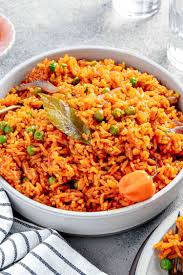Jollof rice now costs N25,486 per pot — Report
The Cost of Cooking One Pot of Jollof Rice in Nigeria Jumps 19% Amid Rising Inflation
Lagos, Nigeria – March 15, 2025
The price of preparing a single pot of jollof rice, a beloved staple in Nigerian cuisine, has surged by approximately 19% over the past six months, highlighting the deepening cost-of-living crisis in the country.
According to recent data from the National Bureau of Statistics (NBS) and market surveys, the cost rose from N21,300 in September 2024 to N25,486 in March 2025, driven by escalating prices of key ingredients like rice, tomatoes, and cooking oil.
This sharp increase underscores the broader economic challenges facing Nigerian households, where inflation has continued to erode purchasing power.
Jollof rice, often enjoyed at family gatherings, parties, and everyday meals, requires a mix of staples such as rice, pepper, onions, vegetable oil, and protein like chicken or beef.
The NBS report attributes the hike primarily to factors including a weakened naira, higher fuel costs, and supply chain disruptions caused by flooding in key agricultural regions.
“The 19% jump is not just about jollof rice; it’s a microcosm of the inflationary pressures affecting food security across Nigeria,” said Dr. Adeola Ojo, an economist at the University of Lagos.
“With rice prices alone increasing by over 25% due to import tariffs and poor harvests, families are being forced to cut back on meals or opt for cheaper alternatives. This could lead to nutritional concerns, especially for low-income households.”
Consumer reactions have been swift, with many taking to social media to express frustration. “What used to be a affordable treat for weekends is now a luxury,” shared Abuja resident Fatima Ahmed on X (formerly Twitter).
“My family has reduced our portions just to make ends meet.” Advocacy groups like the Consumer Rights Protection Agency have called on the government to implement subsidies on essential food items and stabilize the currency to mitigate such rises.
The NBS data, based on average market prices in major cities like Lagos, Abuja, and Kano, shows that the cost breakdown includes N8,500 for rice, N4,000 for tomatoes and peppers, N3,000 for oil, and the remainder for other ingredients and utilities.
This marks the second consecutive quarter of double-digit food inflation, with the overall rate hitting 34% in February 2025, according to the Central Bank of Nigeria.
As the nation heads into the planting season, experts warn that without urgent interventions—such as improved agricultural infrastructure and targeted subsidies—the cost of traditional dishes like jollof rice could continue to climb.
The federal government has promised policy measures in its upcoming budget, but analysts remain cautious about their effectiveness amid global economic uncertainties.
This development serves as a stark reminder of the human cost of inflation, where everyday joys like sharing a pot of jollof rice become increasingly out of reach for many Nigerians.




